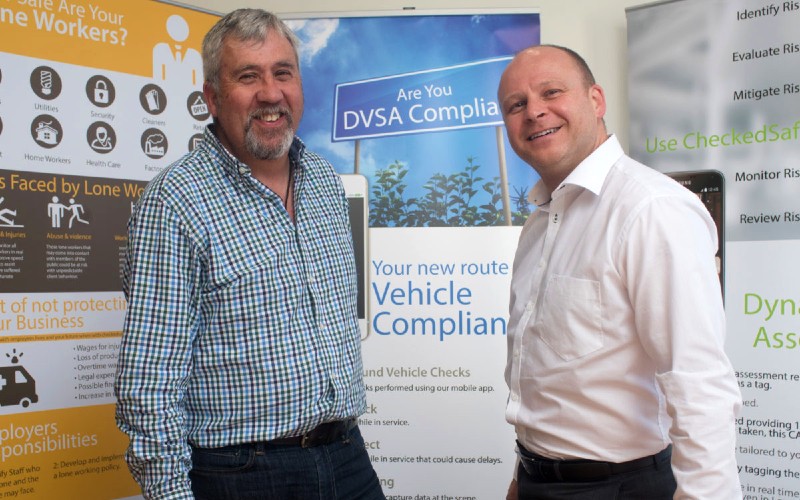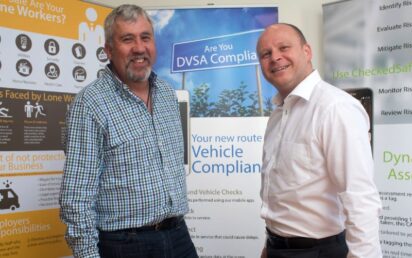There is an adage you often hear within the technology sector: ‘don’t create a solution first then look for a problem to solve’.
Straight-talking Darran Harris doesn’t deal in proverbs, but his business CheckedSafe is the perfect example of how to identify a problem before working out the solution.
The software-as-a-service platform, which launched first in the commercial transport sector, replaces cumbersome and archaic paper-based checklists around compliance with a smartphone-based solution which cannot be manipulated.
Harris was operating a solicitor’s practice when he had his lightbulb moment in 2014. “I represented a company that was in trouble with the Traffic Commissioner at a public inquiry,” he recounts to TechBlast. “This was a company that turned over £2 million a year but wasn’t carrying out proper checks on vehicles and managing things properly. It was at risk of losing its licence [which would have sunk the business].
“As I sat there being b******ed by the Traffic Commissioner, I thought: ‘this is daft – everybody moans about compliance and nobody gets it right’. I had this naive idea that we could simply build an app to solve the problem.”
As all vehicles have SIM cards inside them, to rely upon paper trails for compliance seemed absurd. “Even before the driver knows there’s a problem with that vehicle, the managers and the operators know about it,” explains Harris.
“We’ve got this really sophisticated kit, but the thing that keeps your licence and keeps you in business is not being done properly by anyone.”
He teamed up with Gary Hawthorne – a transport consultant with over 30 years of expertise who had approached him for help with the Transport Commission case – and Burnley-based CheckedSafe launched months later. In 2017 he sold his solicitors’ practice to focus fully on the business as a co-director with Hawthorne.
“Being a solicitor, I was lucky in that people were prepared to listen to me because I could speak with some intelligence about the issues – and because Gary was an operator, he knew them from a practical point of view,” says Harris. “We have the kind of right mix… we weren’t salesmen in shiny suits saying ‘look at this, will you buy it?’
“We could say: ‘we know you’ve got trouble. This is your problem. We will fix it for you.’ It took us a while to get going because it always does.
“But the market is massive: there are more than five million commercial vehicles, roughly 23 million pieces of plant and around a million forklift trucks – and they all require a mandatory check every day.”
A key decision they took was to remove price as a barrier to adoption: fixed at £1 per week per asset, that compared to roughly £1.50-£2 per week for paper-based systems.
“There are other reasons they might not have become an early adopter – people are nervous about new tech, while others want to cheat the system because with paper you can manipulate it – but price was not a factor. And as you can use it with a phone, there is no capital outlay or extra kit required.
“You can become super-compliant really easily – and that problem you have just goes away.”
CheckedSafe, which featured on our sister publication BusinessCloud’s recent RegTech 50 ranking, uses technology to guarantee full compliance.
RegTech 50 – UK’s most innovative compliance technology creators for 2021
“What’s supposed to happen is the driver checks the windscreen and the tyres; but the truth is he can sit in his cab and tick every box – and you’re none the wiser,” explains Harris. “We wanted to be able to say with integrity whether they were doing this properly or not.
“When they log in, we date and timestamp; we geolocate; every time they press a button we record the time so you can see if they’ve raced through in two minutes; and the clever bit is we also use the accelerometer in the device to make sure they’re walking around the vehicle and not just sitting in the cab because it’s raining.
“We then went a little bit further, with locked pages: you have to wait a certain amount of time before you can move to the next page or question. We gave this to customers and said ‘you can use as much or as little as that as you like’ – I’m not a big fan of ‘all stick and no carrot’… they can work out for themselves what to use. It’s fundamentally about changing behaviour.”
Platform updates next year will include logging details around driving hours to ensure safety and provable compliance, while the business is now targeting other sectors such as general health and safety compliance – specifically dynamic risk assessments, auditing and general record keeping.
The system is now more akin to a case management system, enabling customers to carry out checks, plan maintenance and inspections, store documents, set reminders and message operators – all within the confines of one platform.
CheckedSafe now has more than 4,500 customers, more than 85,000 assets in the system and is approaching 10m checks. It has more than half a billion data points. Clients include Amey, Kier, Balfour Beatty, Manchester Airport, HS2, The RAC, Northgate and Hitachi.
Infrastructure company Amey was crucial to its growth. “Amey was our first big client. They were good to us and took us at face value when our product was in its infancy,” says Harris. “It was a springboard because it gave us quite a lot of revenue to build and take members of staff on permanently.
“Early adopters are slow – but as we got going and we got a head of steam up, because we’re a SaaS platform, and because we develop in-house, after our costs our profit margin is something like 99%, while our recurring revenues are 96-97%.
“We grew 40% in the pandemic.”
CheckedSafe delivers a daily summary of statistics around checks to add value for its clients. “We don’t charge for that because the more data we give them and they have with us, the chances are they’re not going to leave us. You have to look after people,” says Harris.
He adds: “We took great heed of what our customers were saying to us because the best people to make your software better are those at the coalface with operational issues.”


